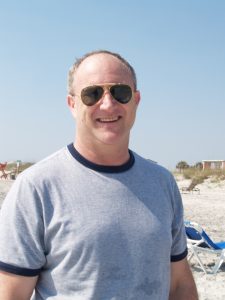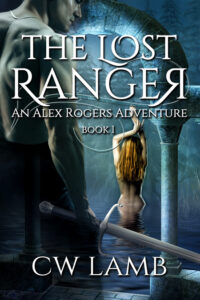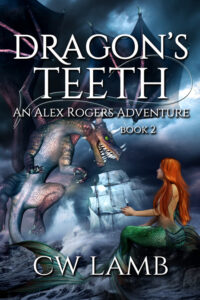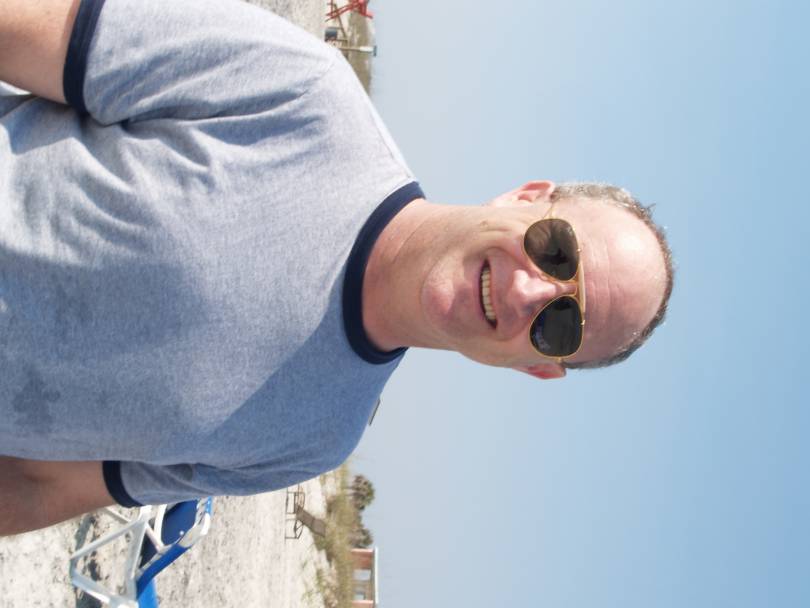
Meet Charlie (CW) Lamb, proud professional member of ALLi
When American engineer Charlie Lamb started writing his first fantasy book on a whim, little did he expect that within three years he'd have sold over 100,000 books. Sharing his success story with us today he draws attention particularly to:
- the joy of doing things his way, following his instincts rather than other authors' advice
- the wisdom making your author business self-funding
- the speed with which indie authors can react
What’s your proudest achievement to date as an indie author?
I just passed 100,000 books sold over five titles with two series in three years. I never expected to sell anything close to that. It’s a great validation that people enjoy my stories and not just in one genre.
What’s the single best decision you ever made?

Where it all began – CW Lamb's first self-published book
To make the books pay for themselves.
From the first, I worked on a shoe-string budget, doing everything myself until there were enough sales to elevate things to the next level. Unlike others I have spoken to, I didn’t buy ads or pay editors, artists or formatters until I had made enough from the books themselves to cover those expenses. On the flip side, I didn’t spend much of what I made on other things either until the book sales were where I wanted them.
What’s been your biggest surprise as an indie author?
People like my books! I started this on a whim, my first book being the very first effort in this area. I was never a short-story writer or poet in my youth. Also, I am taken aback when people compare my writing style to well-known authors of the past and that inspires me to work harder.
What’s your greatest challenge – and how do you deal with it?
Editing. I am an engineer not an English major. My first book was a real challenge for me considering my budget rule. Fortunately, the readers were mostly kind and I was eventually able to afford a great editor.
How do you get/stay in a creative mood?
I use imagery to inspire my characters and locations. Fantasy images and NASA photographs help me try to put my mind into the world I am writing in.
How do you remain productive/motivated?

First book in his second series
For the last three years the ideas have been pushing themselves forward in my head.
My bigger problem is working on what I think needs to be done versus the story banging in my head that wants to be first. It’s hard when I owe the readers the next installment in a series and a completely different subject wants my entire attention.
What’s your favorite thing about being an author–publisher?
The independence to work on what I want and release it when I want.
I am also becoming far too used to the immediacy of indie releases. I track my sales near real time and can quickly react to any feedback regarding my work. Edits, artwork or covers can be quickly added or updated to deliver quality or corrections.
What are your top tips for other ALLis?
Do what feels right to you. ]
So much of what helped me early on were things other authors said not to do.
I read all my reviews, interacted with readers and discussed their complaints and observations. I can’t say all of it came out in my favor, but many a new reader commented that they decided to take a chance on me because of it.
What’s next for you?
I have a paranormal romance series in an agent’s hands that I am really excited about:
-

Out June 20th 2018 – CW Lamb's latest novel
Book 1 tells the story of an army corps of engineers captain who returns to the States to run a historic building restoration company. He buys a dilapidated Victorian home on the river, built as the dowry for a riverboat captain’s daughter, with hopes of restoring its grandeur. Mysterious events during the work forces him to come to grips with its haunted reputation. I split time in every chapter, starting each in the past, telling the story of the character that eventually comes to haunt the house. The second half of each chapter returned to present day activities. In the end the ghost is brought to life by dedication and love.
- Book 2 continues the tale with our newly-returned heroine struggling to control her connection to the afterlife. Images of eighteenth century native and Spanish overwhelm her. I hope to have these traditionally published to increase my market presence and establish a hybrid publishing model.





Charles,
I am reading the first ALICE book.
It is very interesting.
I would not have guessed that it was your first book.
Do you like to hear from readers about potential errors?
Near the beginning of chapter 19. (Second page)
I found the following sentences.
Sent directly to medical with her brother for a standard physical, or so they were told, the ALICEs had a suspicion to confirm. Later she would learn that ALICE wanted blood and tissue samples for a DNA check. She wouldn’t find out the true reason until days later when she asked ALICE about her great, great grandfather.
I think you meant…
She wouldn’t find out the true reason until days later when ALICE asked her about her great, great grandfather.
I am always willing to share what I have learned, the good and bad! 🙂 you can always email me if you dont want to post anything.
Thank you for sharing your story with us! Good luck!
Yes better if his success was explained in the article as opposed to what’s your favourite thing…. Just saying for future blogs
Yes, it’s a good point. I think we’ll add a question going forward. Something like: Can you explain some reasons for your success?
OK I see the questions so let me offer what little I can on the subject. There are a couple of things I can contribute to the question “why did my sales take off?” First unknown to me, I hit the Military Sci-Fi Genre at a time (2014) where I am told there was a shortage of titles. That got me added visibility, where people might take a risk on an unknown due to lack of material.
Second, my story is a tad controversial, and that got me extra visibility as people debated the content of the story. I saw a lot of 5 star and 1 star ratings where people either loved it or thought I was the devil incarnate.
Third was my interactions with those reviews where the readers got involved in the debate over the content. I had a huge word of mouth campaign driving my sales and many a fence rider told me they picked it up due to those review conversations.
Thanks Charlie. This is VERY interesting as the one attribute you had control over flouts the conventional advice to ignore reviews.
I’m also curious how he achieved his sales. I think if ALLi got back in contact and did a follow up piece on this specific aspect it would be very valuable to the indie author community.
Charlie has returned to explain. And to Chris’s recommendation, we’ll ask a more explicit question on this in our future interviews with successful self-publishers
Great article and nice to “meet” Charlie.
I liked this part especially: “So much of what helped me early on were things other authors said not to do. I read all my reviews, interacted with readers and discussed their complaints and observations.”
And as a fellow tightwad, I completely relate to what Charlie was saying about his marketing budget and making the books pay for themselves. That’s been my focus as well since I first published.
I wondered the same thing. Th article title teases that it will share how he sold the books, but doesn’t deliver on that point.
Yes, but how did he sell the books?
See Charlie’s comment… feel free to ask him more questions! 🙂 He is super-helpful